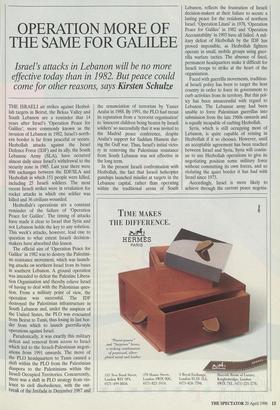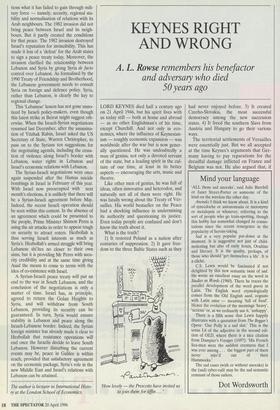OPERATION MORE OF THE SAME FOR GALILEE
Israel's attacks in Lebanon will be no more effective today than in 1982. But peace could
come for other reasons, says Kirsten Schulze THE ISRAELI air strikes against Hezbol- lah targets in Beirut, the Bekaa Valley and South Lebanon are a reminder that 14 years after Israel's 'Operation Peace for Galilee', more commonly known as the invasion of Lebanon in 1982, Israel's north- ern border is far from peaceful or secure. Hezbollah attacks against the Israel Defence Force (IDF) and its ally, the South Lebanese Army (SLA), have occurred almost daily since Israel's withdrawal to the security zone in 1985. Last year there were 890 exchanges between the IDF/SLA and Hezbollah in which 151 people were killed, including 25 Israeli soldiers. The most recent Israeli strikes were in retaliation for rocket attacks in which one soldier was killed and 36 civilians wounded.
Hezbollah's operations are a constant reminder of the failure of 'Operation Peace for Galilee'. The timing of attacks have made it clear to Israel that Syria and not Lebanon holds the key to any solution. This week's attacks, however, lead one to question to what extent Israeli decision- makers have absorbed this lesson.
The official aim of 'Operation Peace for Galilee' in 1982 was to destroy the Palestini- an resistance movement, which was launch- ing attacks on northern Israel from its bases in southern Lebanon. A ground operation was intended to defeat the Palestine Libera- tion Organisation and thereby relieve Israel of having to deal with the Palestinian ques- tion. From a military point of view, the operation was successful. The IDF destroyed the Palestinian infrastructure in South Lebanon and, under the auspices of the United States, the PLO was evacuated from Beirut to Tunis, thus losing its last bor- der from which to launch guerrilla-style operations against Israel.
Paradoxically, it was exactly this military defeat and removal from access to Israel which led to the Israeli-Palestinian negoti- ations from 1991 onwards. The move of the PLO headquarters to Tunis caused a shift within the PLO from the Palestinian diaspora to the Palestinians within the Israeli Occupied Territories. Concurrently, there was a shift in PLO strategy from vio- lence to civil disobedience, with the out- break of the Intifada in December 1987 and the renunciation of terrorism by Yasser Arafat in 1988. By 1991, the PLO had recast its reputation from a 'terrorist organisation' to Innocent children being beaten by Israeli soldiers' so successfully that it was invited to the Madrid peace conference, despite Arafat's support for Saddam Hussein dur- ing the Gulf war. Thus, Israel's initial victo- ry in removing the Palestinian resistance from South Lebanon was not effective in the long term.
In the present Israeli confrontation with Hezbollah, the fact that Israeli helicopter gunships launched missiles at targets in the Lebanese capital, rather than operating within the traditional arena of South Lebanon, reflects the frustration of Israeli decision-makers at their failure to secure a lasting peace for the residents of northern Israel. 'Operation Litani' in 1978, 'Operation Peace for Galilee' in 1982 and 'Operation Accountability' in 1993 have all failed. A mil- itary defeat of Hezbollah by the IDF has proved impossible, as Hezbollah fighters operate in small, mobile groups using guer- rilla warfare tactics. The absence of fixed, permanent headquarters make it difficult for Israeli troops to strike at the heart of the organisation.
Faced with guerrilla movements, tradition- al Israeli policy has been to target the host country in order to force its government to curb activities from its territory. But this pol- icy has been unsuccessful with regard to Lebanon. The Lebanese army had been unable to force Palestinian guerrillas into submission from the late 1960s onwards and is equally incapable of curbing Hezbollah.
Syria, which is still occupying most of Lebanon, is quite capable of reining in Hezbollah if it so chooses. However, until an acceptable agreement has been reached between Israel and Syria, Syria will contin- ue to use Hezbollah operations to give its negotiating position some military force without committing its own forces, and so violating the quiet border it has had with Israel since 1973.
Accordingly, Israel is more likely to achieve through the current peace negotia- tions what it has failed to gain through mili- tary force — namely, security, regional sta- bility and normalisation of relations with its Arab neighbours. The 1982 invasion did not bring peace between Israel and its neigh- bours. But it partly created the conditions for that peace. The 1982 invasion destroyed Israel's reputation for invincibility. This has made it less of a 'defeat' for the Arab states to sign a peace treaty today. Moreover, the invasion clarified the relationship between Lebanon and Syria by giving Syria de facto control over Lebanon. As formalised by the 1990 Treaty of Friendship and Brotherhood, the Lebanese government needs to consult Syria on foreign and defence policy. Syria, rather than Lebanon, is clearly the key to regional change.
This 'Lebanese' lesson has not gone unno- ticed by Israeli policy-makers, even though this latest strike at Beirut might suggest oth- erwise. When the Israeli-Syrian negotiations resumed last December, after the assassina- tion of Yitzhak Rabin, Israel asked the US Secretary of State, Warren Christopher, to pass on to the Syrians ten suggestions for the negotiating agenda, including the cessa- tion of violence along Israel's border with Lebanon, water rights in Lebanon and Israel's economic relations with Lebanon.
The Syrian-Israeli negotiations were once again suspended after the Hamas suicide bombings in Israel in February of this year. With Israel now preoccupied with next month's elections, it is unlikely that there will be a Syrian-Israeli agreement before May. Indeed, the recent Israeli operation should be seen within this context. In the absence of an agreement which could be presented to the people, Prime Minister Shimon Peres is using the air attacks in order to appear tough on security to attract voters. Hezbollah is thus serving Israeli interests as much as Syria's. Hezbollah's armed struggle will bring Lebanese shi'ites no closer to their own aims, but it is providing Mr Peres with secu- rity credibility and at the same time giving Asad the means to come to terms with the idea of co-existence with Israel.
A Syrian-Israeli peace treaty will put an end to the war in South Lebanon, and the conclusion of the negotiations is only a matter of time. Israel has, in principle, agreed to return the Golan Heights to Syria, and will withdraw from South Lebanon, providing its security can be guaranteed. In turn, Syria would ensure stability in Lebanon and peace along the Israeli-Lebanese border. Indeed, the Syrian foreign minister has already made it clear to Hezbollah that resistance operations will end once the Israelis decide to leave South Lebanon. However disturbing the current events may be, peace in Galilee is within reach, provided that satisfactory agreement on the economic package, Syria's role in the new Middle East and Israel's relations with Lebanon can be attained.



































































 Previous page
Previous page